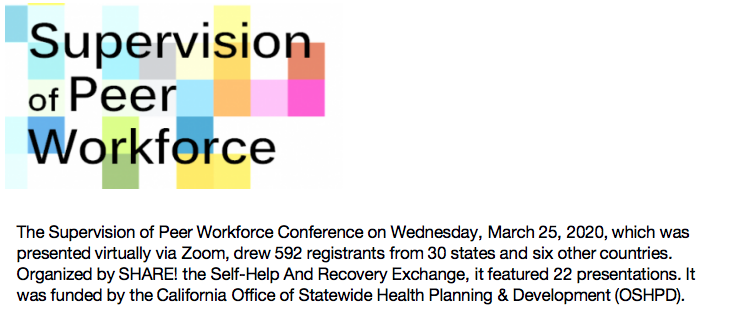2020 Supervision of Peer Workforce Conference
The SHARE! Supervision of Peer Workforce Conference offered the following presentations online on March 25, 2020, attracting 592 Conference Registrants.
Thanks to all who made this a successful conference (Appreciations).
VIDEO PRESENTATIONS:
SYSTEMS APPROACHES
An Intervention to Improve Peer Supervision — Louis Brown, Associate Professor of Health Promotion and Behavioral Sciences, University of Texas POWERPOINT
Framework for Lived Experience (peer) Workforce Development – Australia, Queensland—Louise Byrne, Fulbright Fellow, Royal Melbourne Institute of Technology POWERPOINT
Credentialing Lived Experience – The Peer Support Practice —Shannon McCleerey-Hooper, Peer Policy & Planning Manager, Riverside University Health System POWERPOINT Peer Duty Statements TAY Duty Statement Tech Duty Statement Job Specs Peer Policy 164 SAMHSA Core Competencies for Peer Workers
The Fusion Model for Excellence in Crisis Services —Lisa St George, Director of Recovery Practices, Recovery Innovations, Phoenix, Arizona POWERPOINT
SUPERVISION OF THE PEER WORKFORCE
Trauma-informed Developmental Model of Supervision—Jason Robison, Program Director, SHARE!, Los Angeles, California POWERPOINT
Reducing Stigma in the workplace–Becoming an Ally—Jason Robison, Program Director, SHARE!, Los Angeles, California POWERPOINT
Evidenced-based Peer Practices for Supervisors—Ruth Hollman, Executive Director, SHARE!, Los Angeles, California POWERPOINT RECORDING
Supervision of Peer Support Workers: Is Supervision By Non-peer Supervisors a Mismatch?—Joanne Forbes, Department of Psychiatric Rehabilitation, Rutgers University, New Jersey POWERPOINT
Peer Supervision Practices for an Accountable Capable Workforce and/or Trauma Informed HR Practices—Lynnae Brown, Director, Community Access Inc., Howie The Harp Advocacy Center, New York POWERPOINT
Supporting Peer Partners in the Workforce: Weekly Supervision and Vicarious Trauma Group Work—Ebony Chambers & Christina Cagle, Family Partner Managers, Stanford Sierra Youth and Families, Sacramento, California POWERPOINT Action Plan Staff Meeting Agenda Professional Development Worksheet
You do what, how well? Integrating the peer’s voice and data in supervision—George Braucht, Chief Mission Officer, Brauchtworks, Georgia HANDOUT
Peer Resource Center “StoryCorps”: A Supervisor and Peer Staff Talk About Working Together—Joo “Eric” Lee, Supervisor, & Lori Kerr, Mental Health Advocate, Peer Resource Center, Los Angeles County Department of Mental Health, California POWERPOINT
CORE COMPETENCIES
Are mental health consumer/survivor services forgetting their rich historical heritage of self-help/mutual aid? Some challenges peer support services face and how to tackle them*–Thomasina Borkman, Professor of Sociology Emerita, George Mason University, Fairfax, VA & Affiliate Scientist, Alcohol Research Group, Emeryville, CA POWERPOINT
National Practice Guidelines for Peer Specialists and Supervisors—Rita Cronise, Instructional Designer, Rutgers University & Jessica Wolf, Assistant Clinical Prof. of Psychiatry, Yale University POWERPOINT iNAPS National Supervisor Guidelines
Supervision and the Development of Core Competencies for Peer Workers—Cheryl Gagne, Senior Associate, C4 Innovations, Massachusetts POWERPOINT
Peer Values in Action—Robyn Priest, Live Your Truth, Winnipeg, Manitoba POWERPOINT
Supervision and Co-Supervision for Family Peer Support*–Tammi S. Paul, Deputy Director, Oregon Family Support Network (OFSN) POWERPOINT
SUD Peer Supervision Competencies curriculum —Linda May Wacker, Program Director, Morrison Child & Family Services, Portland, Oregon SUD Peer Core Competencies
Tailoring the Client-Focused Considering Work Model to an HIV peer program—Erin McKinney-Prupis, Assistant Director, Alliance for Positive Change, New York POWERPOINT
HUMAN RESOURCES AND THE PEER WORKFORCE
Growing & Sustaining the Peer Workforce: HR Best practices—Jessica Wolf, Assistant Clinical Professor of Psychiatry, Yale University, New Haven Connecticut POWERPOINT Workforce Integration Practices Handout Five Peer Services Best Practices
Career Ladders and Accountability—Jason Robison, Program Director, SHARE!, Los Angeles, California POWERPOINT
SELF-CARE
Recovery 1st; Family 2nd; Work 3rd: Supervising & Supporting Peers—Stacy Rivera, Oregon Parent Advisory Council & Linda May Wacker, Program Director, Morrison Child & Family Services, Portland, Oregon POWERPOINT
Supervisor Safeguard on Moral Injury for Peers—Adria Powles, Program Director, University of Arizona, Department of Family and Community Medicine POWERPOINT
Peer Work–Can’t pour from an empty cup. Keeping yourself full and well for your clients.— Lisa Cohen, Executive Director, & Jeffrey Cohen, Recovery Coalition of Maryland
*Unable to present due to COVID-19 restrictions
6666 Green Valley Circle Culver City CA 90230; (310) 846-5270 or training@shareselfhelp.org
Program: Supervision of Peer Workforce Conference Program
Flyer: Supervision of Peer Workforce Conference Flyer
Funded by the California Office of Statewide Health Planning & Development (OSHPD)


